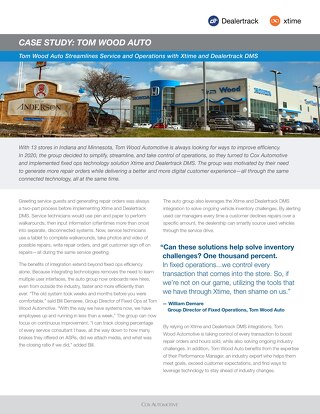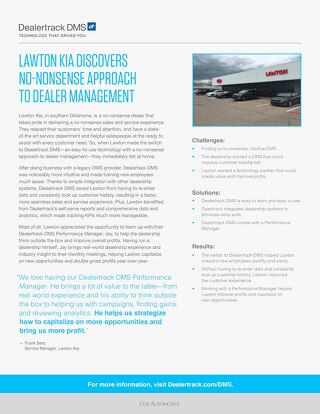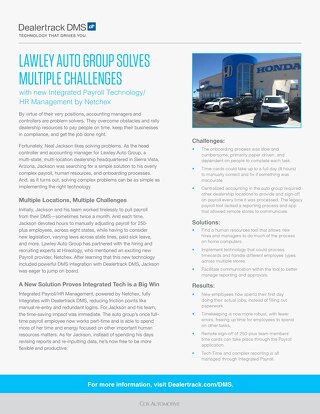Tom Wood Auto Streamlines Service and Operations with Xtime and Dealertrack DMS



Making the move to a new Dealer Management System requires careful consideration from the stakeholders at your dealership. When evaluating the technology that houses the data driving your business, your entire staff will be affected by making the switch. For the team at Greg Hubler Automotive, who made the switch to a new-to-market DMS in early 2022, the promise of a better experience for both their guests and their people was reason enough to leap into the unknown. However, when the promise from their vendor was under-delivered and their employee morale took a big hit, Matt Lohmiller, VP of Operations, was ready to pull the plug. Greg Hubler Automotive is a different kind of dealer—one who truly values its people and its guests. Here’s their story.
A few months after implementing their new DMS, Lohmiller received feedback from his team that things weren’t on the up and up. “I was going to potentially be losing some team members if we stayed (with the other DMS) …and I couldn’t have that.” Employee retention and satisfaction have always been key components of what makes Greg Hubler unique. While going through multiple DMS switches within several months isn’t ideal, Lohmiller took careful consideration from his team and decided to switch to Dealertrack DMS. After hearing their input, it was clear which direction they wanted to go. “We had to make the change,” he recalls.
A key benefit of making the switch to Dealertrack DMS was the ability to observe the implementation process first-hand and compare the difference from Greg Hubler’s previous provider. The switch to Dealertrack DMS was more streamlined and the level of support “has been great, all around,” said Lohmiller. “Even after the implementation team has left, we have a Performance Manager we can reach out to any time.”
For the people at Greg Hubler, the difference has been night and day. The change enabled ownership and management to keep their promise of being a different kind of dealer—one that listens to team members cares for customers and prioritizes people.

Changing technologies might be the right move for your dealership, but it’s never an easy decision. Many dealers hold off switching to a new Dealer Management System for fear of disrupting workflows and downtime. It’s not a decision that any dealer takes lightly, which is why it’s so important to find a DMS partner committed to helping you every step of the way. Watch this video and discover why making the move to a more flexible DMS was worth the switch for these real-world franchise auto groups.
Your DMS provider should be invested in your success. When it comes to the time for installation, your new DMS team should be on-site, ensuring that your dealership has everything it needs to succeed. That means answering your questions, ensuring that every employee is up to speed, and employing industry best practices for data migration and installation.
Once your installation is complete, your new DMS partner should help you get the most out of your new technology. Your provider should have an ongoing presence in your dealership, consulting with your teams on a regular basis to improve performance and help enact operational changes when necessary. Because technology and the auto sales industry are constantly changing, your DMS partner should be forward-thinking, providing ongoing support and updates to help your dealership grow, as the industry evolves.

Your dealership’s data is your business, literally. It’s the key to invaluable insights into your customers, your operation, and the overall performance of your dealership. When you’re in control of how you run your operation—and whom you choose to do business with—you not only save time, but you also save money. Find out why dealers like you are switching to a DMS partner with open and integrated solutions. Watch the video.
Are you spending money to access data you already own? It sounds wild, but certain vendors can and do charge (often hidden) fees just to access customer information. The average dealership now uses up to seven software systems to complete a sale—and that can add up over the course of a year. Most franchise dealers are paying up to $42,000 every year on integration fees, alone. * (Yowza.) A DMS partner who offers seamless integration with bi-directional data flow and third-party software and OEM integration, would speed up processes and save dealers a lot of cash.
How you access your data is just as important as how you share it. Your data should be on demand, not waiting for you the next day after a lengthy overnight download. Your DMS partner should empower you to access your data when you want, whenever you want. With unrestricted data access, you can get up-to-the-minute insight into transactions, account balances, and dealership performances. You have the freedom to make quick, effective decisions at a moment’s notice, with every possible piece of information.
It’s your data. You should be able to access it when, and where, you need it most.
References
*Avg. $500/month x 7 third-party apps x 12 months = $42,000/year

A good salesperson can earn your business. And, often, that business transaction ends at the point of sale. But a great partnership is built long after the ink dries on the contract. Your DMS partner should work hard to help you achieve success. Improving your day-to-day operations and accomplishing long-term goals is an investment in the future. You expect your technology to do a lot for your organization. It’s time to start expecting more from your partners. See why dealers like you are making the decision to switch to a partner invested in their success. Watch the video.
A great business partner should empower you to be the company you want to be. That means working with your team to ensure a seamless installation and technology migration. It means helping you find solutions to all your questions and working with your dealership to get the most out of your technology. Your DMS partner should be an invaluable resource to you, helping your team navigate industry complexities, enact operational change, and grow your business.
Any technology you take the time and resources to invest in should be intuitive to learn for new and experienced employees alike. It should make your operations more efficient by reducing the number of clicks to complete a task and making it easy to access information. That includes being flexible enough to integrate seamlessly with third-party systems and meet the requirements of every dealership department.
Finally, your business partners should be easy to do business with. Technology providers should earn your business every month, giving you the freedom to choose and the ability to change direction at any time. That means offering flexible contract terms, not auto-renew clauses. In other words, you should be in control of the direction of your dealership, not your DMS provider.


Learn how our dealer partners manage complex Payroll and HR processes with new Integrated Payroll and HR Management, powered by Netchex.

Budd Baer Auto Group needed a faster, more efficient Payroll solution that could meet their needs and reduce time loss and risk.

Your dealership runs on technology. And technology runs on data. Mostly. Having access to the right data, at the right time, without problems like hidden fees or nightmare integration challenges, is extremely important. In the brave new world of “all things Big Data,” dealers need to know the three rules of Data Access.
In one study1¹, dealers used an average of 6.8 third-party software integrations to run their dealership. That’s a lot of getting along and playing nice. While this sounds like a lot, the fact that your have the ability to pick and choose the systems that work together is quite remarkable. “(Dealertrack) doesn’t restrict us to just one particular product,” explains Ken Barczyszyn, CFO of Dwyane Lane’s Auto Family. “We can have other relationships with other vendors and products and Dealertrack is open to that.” See it in action.
With multiple software integrations, dealers face the real risk of being taken advantage of by unscrupulous vendors. Accessing your very own data can suddenly come at a cost—a cost that can add up to $42,000 per year². If that sounds unbelievable, consider that many of these fees often go unnoticed and simply add up over time. With as many as half a dozen vendors charging you to access what you already own, those data fees chipping away at your profits can start to feel unfair. See how it adds up.
If you’re considering switching to a new technology like a state-of-the-art Dealer Management System (DMS), consider this: signing a contract should protect, not prohibit, the data that you own. Your data—customer names, personally identifiable information (PII), and records of your transactions—need to be protected. But that doesn’t give a vendor the right to hold them hostage from you. Learn why it matters.

Discover a truly open DMS and find out what your technology is costing you. Learn more.
Sources:
¹https://us.dealertrack.com/content/dealertrack/en/challenges/data-fees.html
²https://us.dealertrack.com/content/dealertrack/en/challenges/data-fees.html

Technology changes every day and, often, businesses have a difficult time keeping up. When your dealership falls behind the technology curve, it’s painfully obvious. Auto dealers, famously, tend to hang onto old technology. While staying put and “making do” with outdated technology is very common, it doesn’t have to be that way. Adopting a Dealer Management System (DMS) that is designed to be easy-to-learn is good for you, your business, and your team. Here are three surprising impacts of implementing easy-to-learn technology at your dealership.
According to one study, it can take up to eight months for your fresh new hires to reach productivity. How many lost sales are walking out the door during that time frame? When your dealership runs on a DMS that is easier to dive into, more intuitive, and that doesn’t require endless memorization, you can rest assured that your team can go from “personnel to professional,” faster.
Dealership turnover reached an overall high at 46% recently, causing many employers to hire based solely on DMS experience to reduce the amount of training required. The problem? Your customer experience will begin to suffer if your staff is chosen based on a skillset that has nothing to do with them. However, bringing in an employee who matches the culture of your dealership, who can learn your DMS, and who is likely to grow with your team in the long term, is a valuable asset.
The workforce is changing as more millennials enter the job market every year. This group of smart, digital natives are eager to learn and happy to work in an exciting industry. And at the top of their list of needs? You guessed it: professional development. In fact, 87% of millennials cited professional development as their top need—above time off and compensation—when looking for a career. If your DMS doesn’t offer continued learning options and a community where they can continue to develop their skills, you will lose them.
While choosing a new DMS is certainly a big decision, finding one that your team can learn without a struggle can help everyone in so many ways. Your new hires can quickly get up-to-speed faster while your hiring managers can recruit for the skills that match your company’s mission and goals. Plus, as your sales people, managers, and team members become more engaged, everyone wins. Watch the video below to see how an easy-to-learn DMS made the decision even easier for these real-life dealerships.